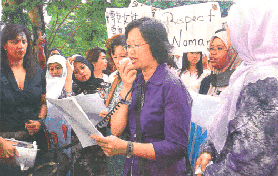Women are the mothers of the world
Dato' Dzulkifli Abd Razak
Article
The New Sunday Times - 05/20/2007
LAST week was Mothers' Day. A perfect reminder that we owe much to this one person for bringing us into this world. Intrinsic to the understanding of the intricate biological process of giving birth is "menstruation". Menstruation can be an indication that pregnancy has not occurred.
It is also commonly called "period" because of the periodic flow of blood and cells from the lining of the womb, once every 28 days or so. It lasts three to five days. Interestingly, besides humans, only the great apes exhibit such physiological cycles; what most mammalian species exhibit is called the estrus cycle.
But to some, this vital biological process is crudely known as a "leak". Some even draw comparisons to a mechanical leak in the roof of a building. Such insinuations, in jest or otherwise, invariably leave a bad taste in the mouth. They are sexist and boils down to being disrespectful not only to women, but to a bodily function which is finely balanced to ensure the survival of the human species.
Indeed, it is said that the ancient Greek physician Hippocrates may have started bleeding sick people after observing women recovering from aches and pains after starting their periods! Far from being a "leak", it is a healthy process that responds to bodily needs.
Article
The New Sunday Times - 05/20/2007
LAST week was Mothers' Day. A perfect reminder that we owe much to this one person for bringing us into this world. Intrinsic to the understanding of the intricate biological process of giving birth is "menstruation". Menstruation can be an indication that pregnancy has not occurred.
It is also commonly called "period" because of the periodic flow of blood and cells from the lining of the womb, once every 28 days or so. It lasts three to five days. Interestingly, besides humans, only the great apes exhibit such physiological cycles; what most mammalian species exhibit is called the estrus cycle.
But to some, this vital biological process is crudely known as a "leak". Some even draw comparisons to a mechanical leak in the roof of a building. Such insinuations, in jest or otherwise, invariably leave a bad taste in the mouth. They are sexist and boils down to being disrespectful not only to women, but to a bodily function which is finely balanced to ensure the survival of the human species.
Indeed, it is said that the ancient Greek physician Hippocrates may have started bleeding sick people after observing women recovering from aches and pains after starting their periods! Far from being a "leak", it is a healthy process that responds to bodily needs.

Women form the Joint Action Group for Gender Equality protesting against the MPs` remark outside the Women, Family and Community Development Ministry last Tuesday.
In his Men on menstruation, Richard Strauss contends: "At its core, the main problem lies in men wanting to dominate .control and subjugate their world and their relationships in it. The witch of the Dark Ages who healed and cherished the sanctity of life became vilified and persecuted for her powers. Women generally were seen as little more possessions and servants.
"Even up to Victoria times, women were still branded as housekeepers and child bearers."
"In order to maintain the boundary of superiority, men have tenaciously misunderstood the phenomenon of menstruation to exemplify woman's inferiority and uncleanness."
Given such an attitude, it is easy to understand why some of them have no qualms in making uncalled for comments and stale comparisons — just because they are biologically spared the discomfort and pain of a regular period, like Strauss said, "menstruation and childbirth are simply not their domain".
Interestingly, Gloria Stenheim, inquires in her essay, If Men Could Menstruate: "So what would happen if suddenly, magically, men could menstruate and women could not?" She suggested, then "menstruation" would become an enviable, worthy, masculine event. They would brag about how long and how much.
"Young boys would talk about it as the envied beginning of manhood. Gifts, religious ceremonies, family dinners and stag parties would mark the day. To prevent monthly work loss among the powerful, Congress would fund a National Institute of Dysmenorrhea. Doctors would research little about heart attacks, from which men would be hormonally protected, but everything about cramps. Sanitary supplies would be federally funded and free." (See www.haverford.edu/psych/ddavis/p109g/steinem.menstruate.html).
My guess, too, is that nobody would dare to call it a "leak", especially in parliament. Instead, as Stenheim wrote, "menopause would be celebrated as a positive event, the symbol that men had accumulated enough years of cyclical wisdom to need no more". And, therefore, worthy of being elected representatives of the people.
But, unfortunately, what a shame it is that those who needed it most are deprived of such ego-trips! In contrast, the so-called "leak" they are experiencing seems to be associated with another malady more closely resembling "oral diarrhoea"!
